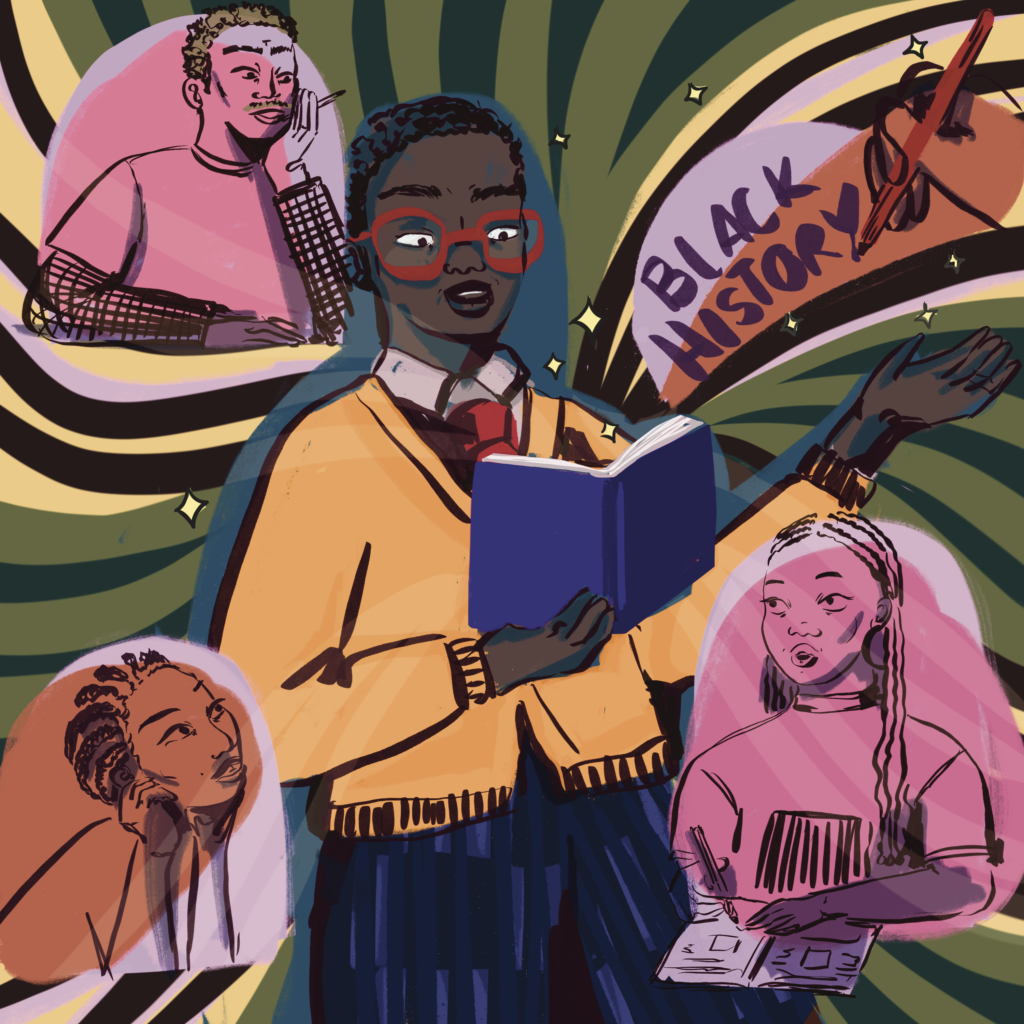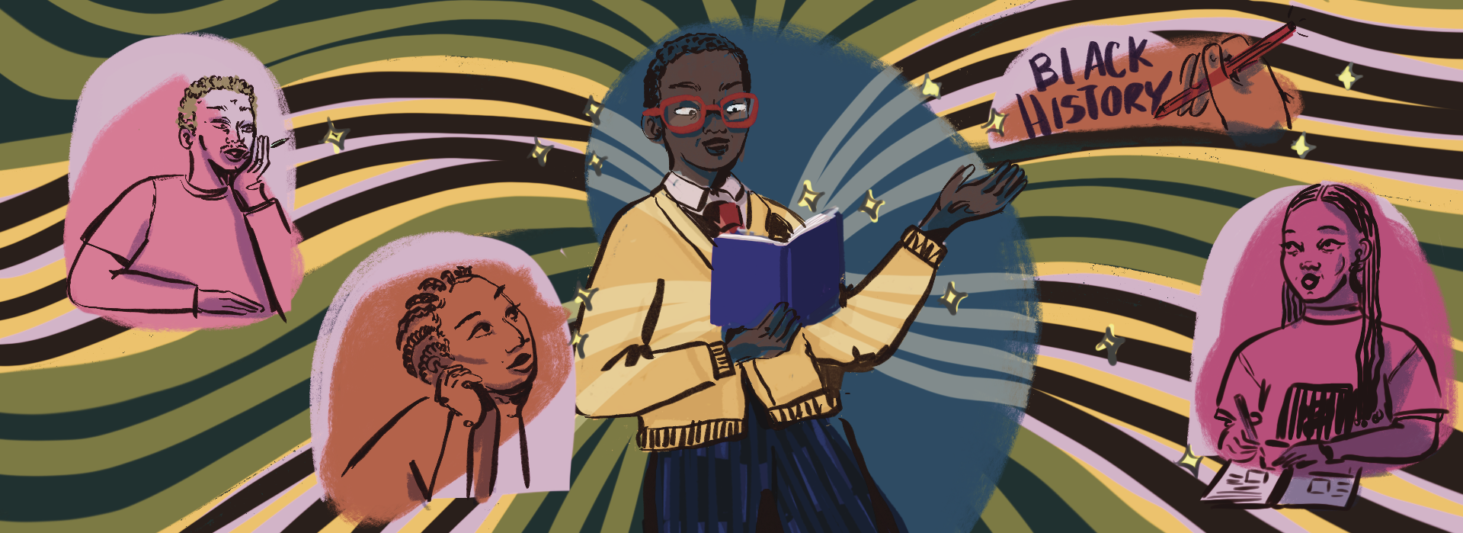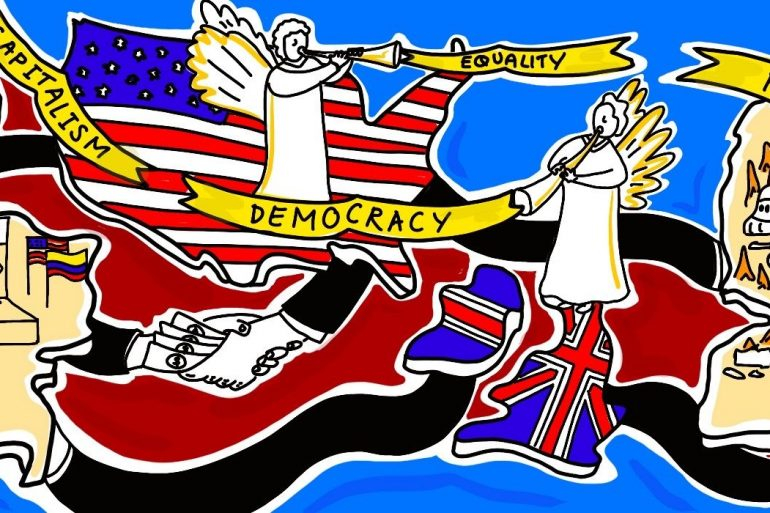In July 2023, The University of Chichester suspended the History of Africa and the African Diaspora course taught by Hakim Adi, the first British history professor of African descent in the UK. Just a few days before being shortlisted for the Wolfson History Prize for his new book, African and Caribbean People in Britain, Hakim was made redundant by the university.
Hakim’s course was a Master’s by Research (MRes) program, the only one of its kind in the UK and Europe. Since taking his course, seven MRes students have undertaken the studies at a PhD level, with six at the University of Chichester. There was a clear allegiance with Hakim both inside and outside the institution, as what followed was an outpouring of support from students and the broader community, including an online petition to save the course and Hakim’s job as well as a Go Fund Me for legal funds to support affected students.
The lack of access to Black British history and censorship of non-Eurocentric curriculum in primary and secondary education is evident. From the lack of Black British History I’ve been taught, I’ve seen that there is a clear need for a change from the prevailing Eurocentric education system and to a decolonial, inclusive framework.
Divide and Rule
Historically, the British Empire has relied on the ideology of ‘divide and rule’, segregating occupied territories on the basis of land and culture in order to ascertain power. The ramifications of this are still seen in the UK today, with data showing enduring racial intolerance in the UK. Decolonial teaching would, however, be a step in addressing the enduring cultural division in the country by facilitating the unlearning of harmful racial stereotypes whilst exploring the history of Black and other marginalised communities.
I spoke to Nehaal Bajwa, NUS Vice President of Liberation, about the link between the lack of decolonial teaching and racial divide. “This divide is always presented as if that’s the way it is – but if we don’t know our history, then we don’t know that this is the result of concentrations of power and how capitalism has shaped our experience,” they say.
That is to say that, if we are not taught our history, then we lack the knowledge of race relations and why there is tension based on racial terms. Perhaps, understanding this in great depth will help us to create solutions for a more just future.
The primary and secondary educational curriculum in the UK excludes Black British History from being taught at schools. In 2014, a new National Curriculum was launched by Michael Gove, the then Education Secretary who was accused of initially implementing a traditionalist history curriculum and erasing any references that focussed on racial and ethnic diversity, particularly on Britain. Years later Gavin Williamson, who also served as Education Secretary, constantly rejected calls to diversify the national curriculum.
A 2015 Runnymede report on diversity and historical curriculum highlighted Michael Gove’s history curriculum “viewed by many academic historians as a retreat to a more conservative and traditionalist view of history.” The Guardian reported that Gove “removed the curriculum’s explicit focus on racial and ethnic diversity, particularly within Britain.” Again, this highlights a erasure of decolonial education that the government is committed to.
Exclusionary curriculums
According to Impact of Omission, a vast majority of British people learned about topics that are relevant to white European history like the Tudors and the Great Fire of London. This parallels my own experience of education – I learned about the Tudors in three separate years throughout primary and secondary education. Come to think of it, almost the entirety of Year 2 was spent on the Great Fire of London.
The survey results also showed less than 10% learned about the role of slavery in the British Industrial Revolution and the colonisation of Africa; Meanwhile, 61% said that the role of slavery in the British Empire was either “mentioned briefly” or not discussed “at all.”
When I learned about the Industrial Revolution, I was never taught about the role of slavery within it. At one point the British Empire was more dependent on cotton slave labour of three million from the USA – but in my classroom, I only heard about the labour conditions of British workers. It feels as if the conditions of African-descended peoples are not deemed relevant in relation to British history.
Countless other excluded events and accounts of history from the eyes of marginalised folks indicates that the government’s definition of British history is deeply selective. To include the suffering of British workers is acceptable it seems but the suffering of those from a foreign land is not part of British history.
“It’s part of our history. That’s not just the history of Black people, it’s the history of white people. We all lived together. What were the relationships between Black people who came over, but also those who were brought over and how? There were also white workers that were racialised like Irish and Jewish workers,” Nehaal says.
Because of the government’s reluctance to bring about a more diverse curriculum, the RHS reports Black and Asian pupils were less likely to take history as an A-Level or a higher educational subject with 4% and 6% respectively studying the subject in Year 13, and 2.4% and 3.8% studying it in University, while they represented approximately a third of students in subjects like business, law and medicine.
Lack of representation at University
In the UK, less than 1% of university lecturers of any subject are Black. This exposes the hypocrisy of universities attempting to demonstrate how they support diversity and progressive policies while sticking by Eurocentric views where there hasn’t been any action by the universities to address racism. I looked at the University of Chichester’s website and they even published a diversity statement pointing out that it is “essential that [their] curriculum and community are inclusive and reflective in which [we] operate.”
However, nothing can be further from the truth. When it comes to actual education, the “diversity” and “inclusivity” stops there – particularly with valuable professors like Hakim being let go when they are needed the most.
This follows a similar pattern in previous years when lecturers of Master’s courses in Queer History and Black British History at Goldsmiths University were threatened with redundancy, the former course being the world’s first of its kind and the latter being the UK’s first Black history specialised MA. It tells us just because a university publicly supports diversity initiatives, it doesn’t mean that courses that are inclusive of Black people will be protected.
History of Black exclusion in education
The Black Education Movement during Britain’s Black Power period in the late 1960s, 1970s and 1980s was also instrumental in an attempted and successful inclusion of Black students in educational initiatives. Supplementary Schools, like the George Padmore and Albertina Sylvester Black Supplementary Schools in North London, were established by Black parents as a result of the institutional racism that affected Black children in schools.
While campaigning for a diverse and inclusive education, supplementary education is needed. Currently, there are 3,000 Supplementary Schools in England that mainly operate as Saturday schools. In the Black Power period, some Supplementary Schools operated on a Saturday or in the evenings. The George Padmore School for older children operated for seven years on Monday, Friday and Saturday.
Although Black history was taught in supplementary schools, the primary focus of these schools when first established was numeracy and literacy. Interviewed by Black Ballad, a community and space created for Black women, Black studies Professor Kehinde Andrews said: “Part of the reason these schools were so popular is because they were dealing with the deficits in Maths and English in the mainstream schools.” Kehinde’s father was part of the African Caribbean Self-Help Organisation in Birmingham where a group of young people ran a Saturday School from a small community building. The organisation still exists today.
Subscribe to shado's weekly newsletter
Exclusive event news, job and creative opportunities, first access to tickets and – just in case you missed them – our picks of the week, from inside shado and out.

Language matters
A scandal was uncovered by future vice-president of Grenada, Bernard Coard, who wrote How The West Indian Child is Made Educationally Subnormal in the British School System. This was in response to a 1969 leaked report by Haringey London Council written by a headteacher named Alfred Doulton, who argued that West Indian children had lower IQs.
This claim was based on the results of IQ tests that were taken by primary school children at the time. Many teachers also saw West Indian children as “intellectually inferior” and feared that Black children in a class would depress the attainment of white children. Many confused race and intellectual ability.
However, the reason why Black children generally scored lower in these tests had to do with a language barrier – they didn’t understand the language that the tests were administered in. If you grew up in a Caribbean household, then you’d probably use the patois or creole of whatever country your family came from. The problem therefore wasn’t that the children didn’t have knowledge: it’s that they did not understand the language that the tests were using.
While some ESOL students would get the necessary help or exemptions, schools did not believe that Black people needed any language support because they believed West Indian patois and creole languages were derivatives of standard English. As a result, West Indian children did not receive the extra help that other immigrant children had received. Teachers did not try and understand the cultural barriers that West Indian children faced.
If the IQ score on the test was low, the child would be sent to an Educational Sub-Normal (ESN) school that did nothing to address the actual problems that pupils faced. Going to an ESN would also make it hard for a person to apply for a job in the future. Black pupils were more likely to be sent to these schools.
Because of the ESN schools, disgruntled West Indian parents decided to take matters in their own hands and established their own learning spaces for West Indian children, filling the gaps of mainstream schooling. The first Black Supplementary Schools were called “Saturday Schools”. They took place in churches, people’s front rooms and any sort of community space that was available to them.
Campaigns to decolonise education
Yet there is still hope in the grassroots for fighting for the decolonisation of the National History Curriculum. The Black Curriculum (TBC) is an example of a grassroots organisation and campaign which aims “to address the Eurocentricity found in local and national curriculums”.
The 2020 Black Curriculum Report (TBC) highlights the significance of teaching Black British History, recognising it as a body of legitimate knowledge that could benefit British society as a whole, improve race relations and unwind damaging racial stereotypes that still exist today.
TBC recommends an acknowledgment of Britain as an ever-changing multicultural society in the past and present with a National History Curriculum that must reflect this. This includes diversifying history teaching workforces since history is an unpopular subject amongst Black and other ethnic minorities, according to a report by the Royal Historical Society (RHS), a body for scholarly studies on history.
Founded by Lavinya Stennett in 2019 after her studies at SOAS University, she wanted to address the lack of Black British History in the national curriculum.
TBC produces programmes suitable for all young people ages 3-25 and “aims to equip young people with a sense of identity, and the tools to navigate a diverse landscape.” Additionally, TBC “aims to embed Black history in the English national curriculum to include a wide range of contextual examples of Black British histories.” TBC provides accessible Black History resources, with a mission to teach all year round “to support social cohesion and knowledge development in young people.”
Paris Williams, a policy campaigner for No More Exclusions, who also worked for the TBC and explained to me how a Manchester school called Cedar Mount Academy improved by implementing anti-racist education. “The school was one of the worst performing schools in Manchester. It had terrible OFSTED rates, high exclusions, pupils not achieving and low attendance.”
Paris explains that through campaigning, one of the teachers was successful in implementing more inclusive education. As a result, she says “there were fewer exclusions and the attendance rates went up because the school is in an area that is predominantly Black and other ethnic minorities.”
She continues: “I think there is something really powerful about having an education system that reflects you and keeps you engaged.”
From speaking to Paris it seems that the reason why students were not attending the school and being excluded at high rates was because they were not seeing themselves reflected in the curriculum. Once their cultural differences were being prioritised, there was more engagement from the pupils as they were being included.
How anti-racist education benefits Black children
Like the supplementary schools that were founded to address the cultural needs of West Indian children, Cedar Mount did the same for pupils from ethnic minority backgrounds. Referring to the academy’s improvement, Paris adds: “That really made me think that there is a clear link here between attainment and just general health of people in school to how well a school performs, particularly in areas that are predominantly Black.” Installing a new anti-racist curriculum saw some vast improvements in their most recent OFSTED report with reaching a Good rating in most of the assigned areas for the first time.
Although Black history was taught in supplementary schools, the primary focus of these schools when first established was numeracy and literacy. Interviewed by Black Ballad, a community and space created for Black women, Black studies Professor Kehinde Andrews said: “Part of the reason these schools were so popular is because they were dealing with the deficits in Maths and English in the mainstream schools.” Andrews’ father was part of the African Caribbean Self-Help Organisation in Birmingham where a group of young people ran a Saturday School from a small community building. The organisation still exists today.
From speaking to activists and organisers working towards decolonisation it appears that the selective curriculum of British history seems rooted in the censorship of Black and decolonial history. This censorship includes the government erasure of any references to diversity in the National Curriculum and scrapping of Black history in academia, punishing academics like Hakim Adi for creating the course.
These issues and speaking to the collective of organisers and educators in this piece has reinforced my belief that there needs to be a change in the national curriculum, not just in History, but a more inclusive curriculum to clamp down on institutionalised racism in education, addressing the needs of Black people and other minorities.
There is hope on addressing this issue through a mix of short-term and long-term approaches. A short-term approach is supplementary education. No More Exclusions has a mix of both approaches – ending racial disparities in the next five years and changing “legal, policy, practice and cultural level in education and society as a whole” in the next ten years. These campaigners include activists, students, teachers and scholars alike that are fighting for a structural change in education.
In terms of Higher Education, campaigns such as NUS Divest to Decolonise, work to decolonise universities with different student-led organisations to address how universities are complicit in imperialism and colonialism, such as past links from the Trans-Atlantic Slave Trade, or links to weaponry of Israel and fossil fuel companies, from the past and the present, discussing tactics on how to fight against this, such as doing some deep research on the institution, conducting a meeting with the Vice-Chancellor, petitioning and direct action.
These current campaigns bring hope to bring justice for those in academia and in schools and bring a better future in smashing such reactionary values that stops non-racist and diverse education from being taught. Only effective movements like these can prevent the selectiveness of our history curriculum and contribute to a more non-Eurocentric education to make sure that they are striving for a more equal and inclusive society to address issues that are negatively affecting students, teachers and academics from ethnic minority groups.
What can you do?
The long-term goal would be to include Black British History and an anti-racist curriculum where the next generation can strive for an anti-racist society by understanding past and present issues to pave a way for the future.
Read:
- “African and Caribbean People in Britain: A History by Hakim Adi to learn more about the contributions of Black people in Britain
- “Capitalism and Slavery” by Eric Williams to learn about Britain’s creation of the Trans-Atlantic Slave Trade
- The Voice newspaper, the sole national newspaper for Black people in the United Kingdom
- Black History Month 2024 is dedicated to all things Black history in Britain
Watch:
- 1980 film “Babylon” to learn about the lives of Black youths in Thatcherite Britain
- 1978 documentary “Blacks Britannica” to understand institutional racism from a radical perspective
Support, donate and learn from campaigns fighting to implement an inclusive education and environment:
- The Black Curriculum
- No More Exclusions, which fights against school exclusions that disproportionately affects Black children
- Young Historians Project, co-founded by Hakim Adi, run by young black people to promote Black British history
- NUS Divest to Decolonise Campaign, which works with a range of student-led organisations to address and fight against universities’ colonial and imperialist links















